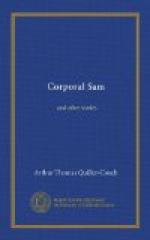’Even at the present day
this is a well-understood mode of
defence, as will be seen from the following:—
’At Argos one evening, at the table of General Gordon, then commander-in-chief in the Morea, the conversation happened to turn on the number and fierceness of Greek dogs, when one of the company remarked that he knew a very simple expedient for appeasing their fury. Happening on a journey to miss his road, and being overtaken with darkness, he sought refuge for the night at a pastoral settlement by the wayside. As he approached, the dogs rushed out upon him, and the consequences might have been serious had he not been rescued by an old shepherd, the Eumaeus of the fold, who sallied forth and, finding that the intruder was but a frightened traveller, after pelting off his assailants, gave him a hospitable reception in his hut. His guest made some remark on the watchfulness and zeal of his dogs, and on the danger to which he had been exposed in their attack. The old man replied that it was his own fault for not taking the customary precaution in such an emergency, that he ought to have stopped and sat down, until some person whom the animals knew came to protect him.
’As this expedient was new to the traveller he made some further inquiries, and was assured that if any person in such a predicament will simply seat himself on the ground, laying aside his weapons of defence, the dogs will also squat around in a circle; that as long as he remains quiet they will follow his example, but as soon as he rises and moves forward they will renew the attack.’
At this point the doctor laid down his pen, arose, and went to the book-case for his Homer, with purpose to copy the original lines into a footnote—for, to tell the truth, he had never quite mastered the methods of the Greek accents. He found the passage in Odyssey 14. Yes, it was all right—
autar
Odysseus
Ezeto kerdosune, skeptrou
de oi ekpese cheiros . . .
But—hallo! what was this next line?—
Eutha kev o para stathmo aeikelion pathen algos . . .
—’There by his own steading,’ the poet went on, ’would Odysseus have suffered foul hurt, had not the swineherd hurried out and scolded the dogs and pelted them off with stones.’ It would seem then, according to Homer, that this device of squatting upon the ground could not be trusted save as a diversion, a temporary check. Doctor Unonius bit his nether lip. Strange that he had overlooked this. . . .
He had a scholar’s conscience. He could not endure to garble a quotation or suppress a material point for the sake of illustrating an argument more vividly. . . . Besides, it might delude some unfortunate person into sitting down where self-preservation demanded a more alert posture. Somebody—dreadful thought!—might get himself severely bitten, mauled, mangled perhaps to death, merely by obeying a piece of pseudo-scientific advice. That he, Doctor Unonius, might never be reproached with the disaster, might never even hear of it, in no degree mitigated his responsibility.




